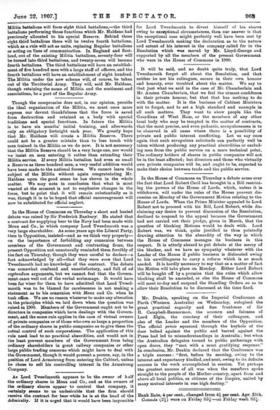In the House of Commons on Thursday a short and
heated debate was raised by Sir Frederick Banbury. He stated that a contract for supplying beer to the Navy had been made with Meux and Co., in which company Lord Tweedmouth was a very large shareholder. As some years ago the Liberal Party, then in Opposition, insisted—and as we think very properly— on the importance of forbidding any connexion between members of the Government and contracting firms, the present Opposition not unnaturally reminded them forcibly of the fact on Thursday, though they were careful to declare—a fact acknowledged by all—that they were sure that Lord Tweedmouth had no knowledge of the contract. The debate was somewhat confused and unsatisfactory, and full of ad calstancluta arguments, but we cannot feel that the Govern- ment came well out of the verbal scrimmage. It would have been far wiser for them to have admitted that Lord Tweed. month was to be blamed for carelessness in not making a statement as to his connexion with Meux and Co. when he took office. We see no reason whatever to make any alteration in the principles which we laid down when the question was raised in 1900. Members of the Government ought not to be directors in companies which have dealings with the Govern- ment, and the same rule applies in the case of virtual owners of private companies or of those who own so large a proportion of the ordinary shares in public companies as to give them the actual control of such corporations. The application of this rule need lead to no practical absurdities, and would not in the least prevent members of the Government from being ordinary shareholders in great railway companies or other large public trading concerns which might have to deal with the Government, though it would prevent a person, say, in the position of Lord Armstrong from entering the Cabinet, unless he chose to sell his controlling interest in the Armstrong Company.










































 Previous page
Previous page